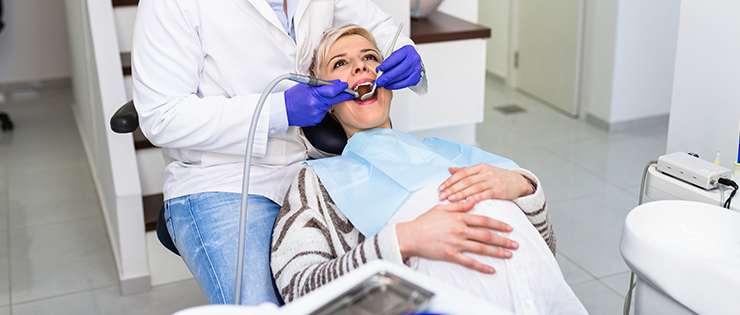
So you're pregnant? Congratulations! Prepare yourself for a bombardment of unsolicited advice from well-meaning people, but keep in mind that Barbara from next-door might not have the same expertise as your health professionals. A common misconception, (pardon the pun), about pregnancy is that you need to avoid visiting your dentist. Nothing could be further from the truth, as your dentist plays an important role in making sure your baby arrives safe, healthy, and stays that way.
If there's any chance you are pregnant, for example if you're trying but it's early days, still tell your dentist. They can tailor your treatment with your pregnancy in mind. If your oral health is good enough that you only see your dentist once a year, this might be the one chance you get to soak up any relevant information. But the reality is that the vast majority of dental treatment is safe during pregnancy, there's just a few precautions your dentist will take to keep you and your baby safe.
Local anaesthetic
The numbing agents used in everyday dentistry have been proven safe for pregnancy, so there's no reason to avoid routine treatment because anaesthetic is required. Scale and cleans, fillings, and simple extractions are all safe. The only concern is that your dentist avoids anaesthetic containing the vasoconstrictor felypressin, as it has the potential to restrict blood flow to the placenta. Every dentist knows this though, and it's rarely an issue because felypressin is not in our most commonly used anaesthetics anyway.
X-rays
The golden rule for radiation is ALARA - As Low As Reasonably Achievable. Modern digital dental radiographs are extremely low dose, the radiation exposure is less than you'd get from a domestic flight. But less is always better with radiation, so non-emergency x-rays are best avoided during pregnancy. However, it's important to keep the risk in perspective. If you have a raging infection in your mouth that requires an x-ray to be treatable, it's going to be much lower risk to your pregnancy than perhaps needing several courses of antibiotics and painkillers. If you have any reason to believe you may be pregnant, tell your dentist and they can cover your bump with a lead apron for an extra level of safety.
Sedation
For non-urgent treatment, it's best to avoid being sedated unless absolutely necessary. As I said above, it's all about balancing risk vs benefit. Nitrous oxide, ("laughing gas"), can be used safely if in the correct dose and for less than 30 mins at a time, but your dentist will likely recommend it only for essential treatment that can't be delayed until after the birth of your baby. Any deeper forms of sedation such as general anaesthetic would be managed by a specialist anaesthetist, with a similar philosophy in mind. Pregnancy is not the time to have that elective wisdom tooth removal under a GA.
Root canal therapy
This is a bit of a hot topic at present, but the fact is there is strong evidence to show that root canal therapy is safe, and over 90% effective when done well. The only concern for a pregnant woman is that x-rays are required throughout the procedure, so it makes sense to delay non-essential stages until after you baby is born. The exception is the initial, usually emergency stage when there is active infection, in which case a single x-ray is far less risky than leaving your infection untreated for months on end.
Elective treatment
Cosmetic treatment such as veneers and whitening can potentially be done safely during pregnancy, but the sensible choice is to wait. Pregnancy hormones affect your gums making you more prone to gingivitis, so whitening gels and veneer preparations can be more irritating. The inverse can be said for a scale and clean, because the primary cause of pregnancy gingivitis is plaque. Your hormones just make your gums more sensitive to it, so having an extra-clean mouth is extra-important during pregnancy.
Pregnancy is a great time to visit your dentist. Preventative care is even more important than usual, because avoiding a dental emergency means you'll avoid needing treatment that may present a risk to your baby.